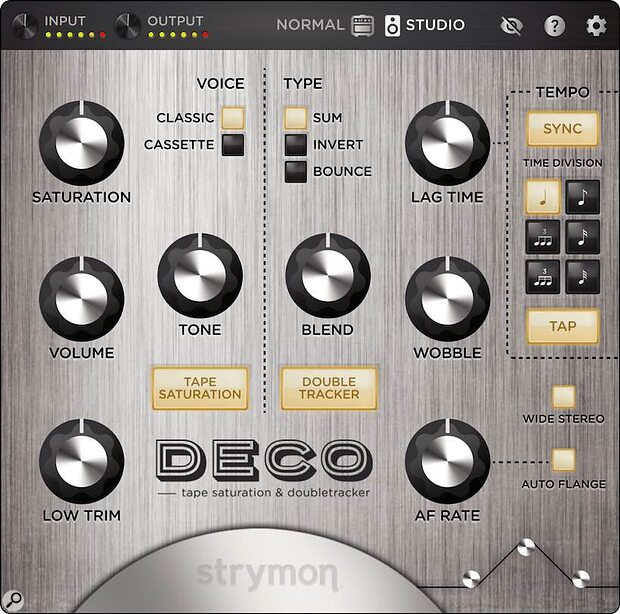When Strymon released the Big Sky Plugin last year, many hoped that plug-in versions of their other popular effects pedals would start to follow. The company have now announced another software launch, and this time, it’s the turn of the Deco Tape Saturation & Doubletracker.
The Deco Plugin, like its hardware counterpart, is divided into two sections, offering a mixture of analogue tape-inspired effects. The Tape Saturation section behaves much like you’d expect, introducing varying degrees of compression and saturation that range from a subtle enhancement to a much more obvious, overdriven sound. The Doubletracker section then emulates a pair of tape decks (Reference and Lag) and allows users to adjust their relative timing to create everything from subtle doubling effects to flanging, chorusing and slapback echoes.
Two Tape Saturation modes are available: Classic and Cassette. The former models the response and characteristics of a professional two-track mastering machine, whilst the latter employs an auto level control (ALC), something which was commonplace in many cassette tape recorders in the 1970s and results in a ‘fat’, compressed tone. The amount of processing applied is defined by a Saturation parameter, whilst a Volume control helps to maintain a consistent level at the plug-in’s output. There is also a Tone knob to adjust the section’s frequency response and finally, a Low Trim parameter helps to keep low-frequency content under control.
Over on the Double Tracker side, users have a choice of three modes: Sum, Invert and Bounce. The first sums both virtual decks together, whilst Invert sums the two together with the polarity of one deck reversed. Bounce mode then alters the decks’ output routing to create ping-pong effects in stereo, or double-echo effects in mono. A Blend control sets the mix level between the plug-in’s Reference and Lag decks, allowing users to define the overall level of the effect. Lag Time adjusts the time shift applied to the Lag deck, moving the plug-in through its flanging, chorusing and echo effects. Random modulation can be introduced using the Wobble control, and a switchable Auto Flange feature automatically creates a smoother and more predictable flanging effect, which can be controlled further using an AF Rate dial.
The effect has also gained the ability to be sync’ed to a DAW tempo and is equipped with a selection of time division options. The rate of the effect can also be set manually using a Tap button in the GUI. There is also a Wide Stereo option, which carries out some channel-based trickery to offer increased stereo width that can be controlled with the Blend control. Lastly, there is a Studio Mode — which is selected by default — that offers an additional 10dB of headroom.
We reviewed the hardware version of the plug-in in SOS October 2015, click here to take a look.
Compatibility
Deco Plugin is supported on PCs running Windows 10 and above, and Macs running macOS 11.6.4 and higher. It is available in VST3, AU and AAX plug-in formats. It is authorised via PACE’s iLok system but does not require a physical dongle.
Pricing & Availability
Deco Plugin is available now, priced at $79.

